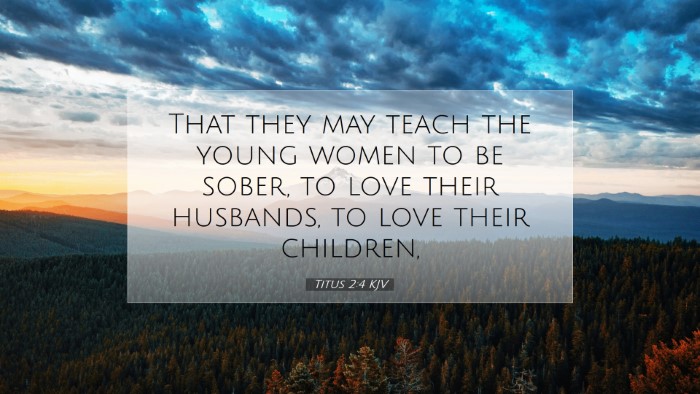Old Testament
Genesis Exodus Leviticus Numbers Deuteronomy Joshua Judges Ruth 1 Samuel 2 Samuel 1 Kings 2 Kings 1 Chronicles 2 Chronicles Ezra Nehemiah Esther Job Psalms Proverbs Ecclesiastes Song of Solomon Isaiah Jeremiah Lamentations Ezekiel Daniel Hosea Joel Amos Obadiah Jonah Micah Nahum Habakkuk Zephaniah Haggai Zechariah MalachiTitus 2:4
Titus 2:4 KJV
That they may teach the young women to be sober, to love their husbands, to love their children,
Titus 2:4 Bible Commentary
Commentary on Titus 2:4
Titus 2:4: "Then they can urge the younger women to love their husbands and children."
Overview
This verse forms part of the apostle Paul's instruction to Titus regarding the conduct of different groups within the Cretan church. Paul emphasizes the vital role that older women should play in guiding and teaching younger women to lead lives characterized by love and virtue.
Historical Context
In the context of Crete, where Titus was ministering, the culture was often marked by moral laxity and challenges to traditional family values. Paul’s directive underscores a necessary return to godly principles. The encouragement for older women to instruct the younger is a call for continuity of faith and practice within the home and the community.
Theological Insights
- The Role of Older Women: Matthew Henry emphasizes that older women must lead by example. Their wisdom and experience in navigating life’s challenges equip them uniquely to guide younger generations.
- The Nature of Love: Albert Barnes interprets the verse as a reminder of the sacrificial love that should characterize the relationships in the home—love for husbands and children is presented as fundamental to a healthy family dynamic.
- Faith and Responsibility: Adam Clarke notes that the exhortation to love is not merely an emotional endeavor, but one that encompasses responsibility, demonstrating that love must be active and not passive.
Exegesis and Analysis
When Paul declares that older women should teach the younger, he highlights the importance of mentorship within the church. This mentorship is not only a transfer of knowledge but also a transmission of character and values that are essential for sustaining family integrity and community strength.
The verb "urge" implies a sense of urgency and necessity. It is an active encouragement that suggests the older women are not merely advising but are engaging in a relational dynamic that encourages younger women to embrace their roles within the family.
Practical Implications
- Mentoring Relationships: The church should foster environments where older women feel empowered to teach the younger women. This could take the form of small groups, Bible studies, and informal gatherings.
- Workplace and Home: Paul's admonition extends beyond the walls of the church; it influences the workplace and societal roles, affirming the importance of Christian love and family values influencing all domains of life.
- Emotional and Spiritual Development: The passage encourages both emotional intelligence and spiritual growth as vital components of loving relationships within the family unit.
Conclusion
Titus 2:4 serves not only as an instruction but as a reminder of the profound legacy that older women can present to the younger generations. The heart of this verse centers on love—not just as an emotion but as an essential principle guiding behavior within families that reflects Christ’s love for the church.
As pastors, theologians, and scholars consider this text, the emphasis on nurturing relationships should challenge them to think about how mentoring roles can be cultivated in contemporary settings, reclaiming the power of relationship as a core teaching of the Christian faith.


